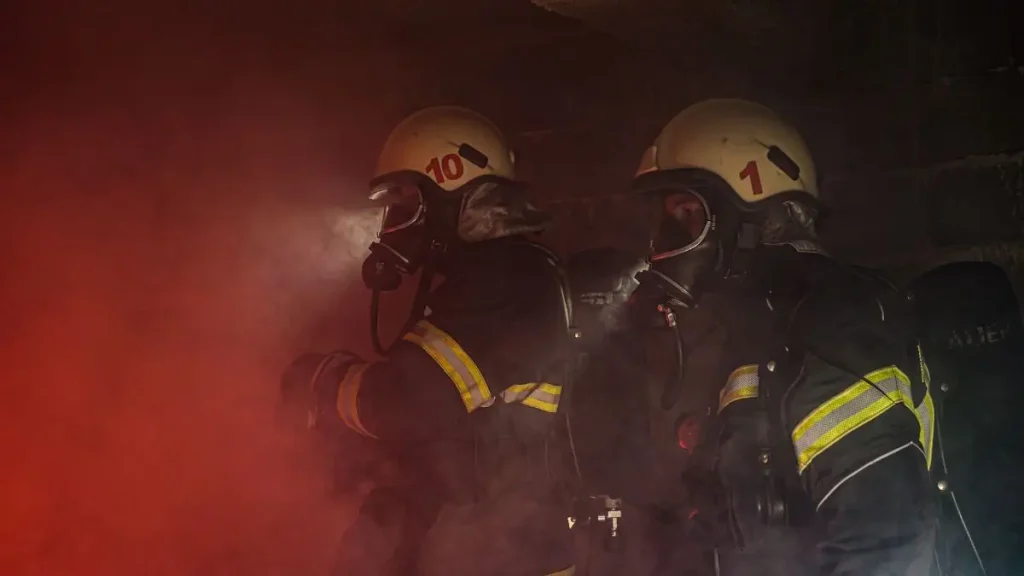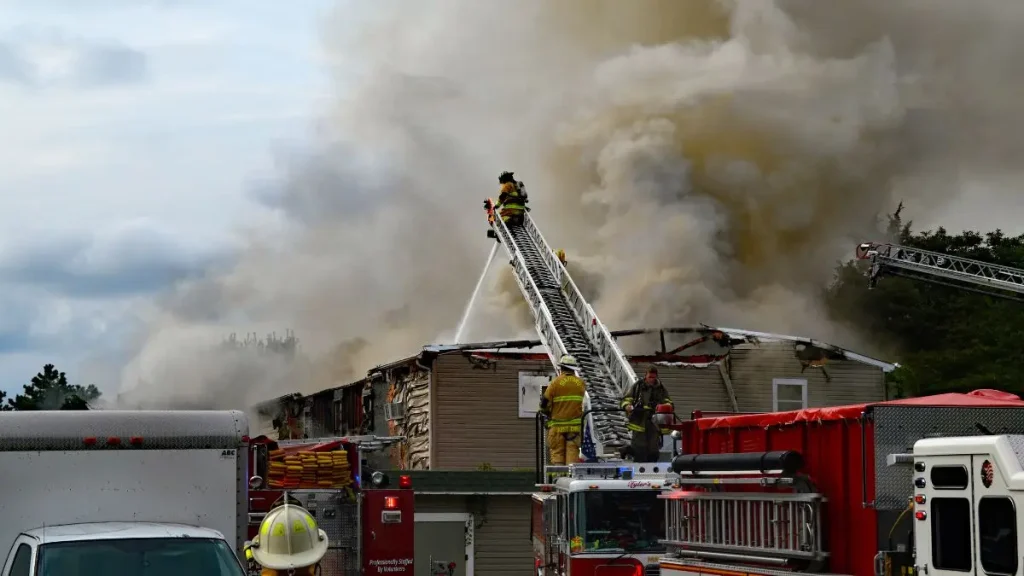Home Destroyed, Two Dogs Dead After Maine House Fire
It was just another Monday morning in Kingfield, or so it seemed. At 8:49 a.m., the calm was broken by a call that would change one house forever. A structure fire had been reported at 48 West Kingfield Road.
Within minutes, Ladder 192 rolled out with Capt. Stewart and a new orientee. I can’t imagine the adrenaline as they drove, not knowing exactly what they would face. FTO Godin and another trainee, already nearby, joined them immediately.
When they arrived, flames were visible on three sides of the house. The structure was already unstable. The team had to make a tough call—go defensive rather than risk lives. It’s the kind of decision every firefighter dreads, but sometimes safety must come first.
The cause? Preliminary reports suggest it started near a wood stove. Something so ordinary, so routine, yet capable of unleashing such destruction. If you have a wood stove, it’s a sobering reminder to stay vigilant.
And there were pets inside—two dogs. One was rescued by a passerby, but both ultimately didn’t survive. That part of the story, the human—or animal—cost, is what stays with you. Fires aren’t just about buildings; they’re about lives, routines, and the small things we love.
Firefighting Efforts: Coordinated Response
The moment the fire broke out at 48 West Kingfield Road, it was clear that Kingfield Fire alone couldn’t manage it. Ladder 192, Engine 191, and Squad 193 were on scene within minutes, but the flames were already fierce, visible on three sides of the house. FTO Godin and another orientee, who were nearby in training, jumped into action immediately.
This was more than a single-team operation. Engines and crews from Carrabassett Valley, New Portland, Strong, Phillips, and New Vineyard arrived to support the defensive strategy. Around 30 firefighters were now coordinating under extreme pressure, moving in perfect unison to contain the blaze. Safety was paramount. The structure was unstable, and any misstep could have had serious consequences.
The Kingfield Fire Department shared updates on Facebook, highlighting the teamwork and rapid response. When parts of the roof began collapsing, they brought in an excavator from Jordan Excavation to dig out hotspots and support the crews.
Watching this level of coordination, you realize firefighting isn’t just about putting out flames—it’s about strategy, trust, and split-second decisions.
Even with all the manpower, the blaze was relentless. Defensive tactics meant that the crews focused on containing the fire and protecting nearby structures, rather than risking lives inside a crumbling building. It’s a sobering reminder of how dangerous even a single residential fire can be and how much goes on behind the scenes to manage it effectively.
Tragic Loss: Two Dogs Did Not Survive
While the firefighting efforts were underway, the human—or in this case, animal—impact became painfully clear. The house was empty except for two dogs. One had been pulled outside by a passerby, but despite everyone’s best efforts, both dogs tragically did not survive.
The story was reported in detail on Central Maine, and it’s heartbreaking. You start thinking about all the small lives affected in fires—not just humans, but pets who depend on us completely. Fires don’t just destroy property; they take away pieces of our everyday lives, our routines, and those little beings we care for most.
This part of the story hits hardest because it’s personal. It’s easy to focus on the fire as a statistic, but the loss of two dogs reminds us that real life—emotions, bonds, and memories—are at stake in every blaze. It’s the kind of detail that sticks with you, long after the flames are gone.
Property Details and Impact

The house itself was fully destroyed. Owned by residents who were away at the time, the building had no humans inside, but the financial and emotional impact is still staggering. A home isn’t just walls and a roof; it’s safety, memories, and a place where life happens.
The suspected wood stove as the origin adds another layer to the story. It’s a common household appliance, yet in a few short moments, it can become a source of massive destruction if not maintained properly.
Reading about this, I found myself thinking about my own home—just like the six residents who had a narrow escape in the Miami-Dade house fire, small oversights can have outsized consequences.
While insurance details aren’t public, the loss is total. It’s a stark reminder that disasters can strike anyone, and preparation, vigilance, and awareness are critical.
Community Response and Support
Even amid tragedy, community response stands out. The Red Cross was contacted to assist the residents, providing emergency support and resources. Local businesses stepped up too—Tracy Bessey and Anni’s Market supplied food and drinks for the exhausted crews, helping sustain them through the long hours of firefighting.
It’s inspiring to see how neighbors and local organizations rally together. When disaster strikes, it isn’t just first responders who matter. Volunteers, local businesses, and community members all play a vital role in mitigating the impact. This ripple of support often goes unnoticed, but it’s a crucial part of the story.
The Kingfield fire also reminds us that disasters aren’t isolated, similar to when a Rhode Island home was severely damaged after an intense fire. Every incident tests not just emergency systems but the social fabric of a town.
Lessons Learned and Fire Safety Tips
After the fire is finally out, the questions linger: what could have been done differently? How can similar tragedies be prevented? Fires like Kingfield’s serve as powerful reminders of preparation and vigilance.
Wood stove maintenance is critical. Smoke detectors should be tested regularly, batteries replaced, and fire extinguishers checked. Homes need clear escape plans, and pets should be included. Even something as small as a routine check can make the difference between life and tragedy.
The Kingfield blaze isn’t just a news story—it’s a cautionary tale. It pushes you to think: are you doing enough at your own home to prevent a fire? Are your loved ones, human and animal alike, protected? Prevention isn’t complicated, but it requires attention, consistency, and respect for the risks that surround us.
For quick updates and safety tips you can access on the go, many readers follow our instant alerts via WhatsApp—it’s like having fire safety reminders in your pocket.
Wider Context and Local Fire Trends

When you step back from the Kingfield fire, it’s clear this wasn’t an isolated incident. Maine has seen several residential fires in recent years that highlight ongoing risks, particularly in rural communities with wood stoves and older homes.
Just a few weeks earlier, a fire in Avon tragically killed 11 dogs and 4 cats. Another blaze in Bethel led to the deaths of two dogs, with one surviving. These incidents, though reported separately, form a troubling pattern—pets often become the hidden victims, and rapid response can make a life-or-death difference.
Looking at these trends, you begin to see the importance of community preparedness, much like the coordinated response when a Georgia home fire displaced three residents.
Mutual aid between fire departments, like what we saw in Kingfield, isn’t just a bonus—it’s essential. Towns like Kingfield, Carrabassett Valley, and New Portland pool resources, training, and manpower to handle emergencies that would overwhelm a single department. It’s a reminder that firefighting isn’t just local—it’s regional coordination under pressure.
These events also underline the need for practical precautions at home. Routine maintenance of wood stoves, functional smoke detectors, and a clear emergency plan aren’t optional—they’re lifesaving. And yet, many homeowners overlook these small steps until it’s too late. Reading about Kingfield, Avon, and Bethel, you realize that prevention is the thread connecting safety across every home, town, and community.
Beyond practical measures, there’s also the emotional impact. Communities rally, support networks activate, and neighbors step in, but nothing fully replaces what’s lost. Fires don’t just burn buildings—they disrupt lives, memories, and the small, irreplaceable things we hold dear.
If you live in Maine or anywhere with similar fire risks, ask yourself: Are your smoke detectors working? Is your wood stove inspected? Do you have an escape plan that includes pets? These aren’t just hypothetical questions—they’re the difference between safety and tragedy.
Reflections and Takeaways from the Kingfield Fire
Reading about the Kingfield house fire, it’s impossible not to feel the weight of loss—two dogs, a home, and the sudden disruption of a family’s life. But beyond the tragedy, there are lessons we can carry with us. Fires like this remind us that preparation isn’t optional—it’s essential.
Check your smoke detectors today. Inspect your wood stove or any heating equipment in your home. Make a clear escape plan for every member of your household, including pets. Even small steps can make the difference between a close call and a tragedy.
What struck me most about Kingfield was the power of community. Firefighters, neighbors, local businesses, and organizations like the Red Cross all came together. It’s a reminder that safety isn’t just personal—it’s collective. Watching people step up in moments of crisis is both inspiring and a call to action: be the neighbor, the friend, or the volunteer who makes a difference.
If you take anything away from this story, let it be this: Fires don’t wait. Neither should your preparation. Protect your home, protect your loved ones, and don’t underestimate the value of community.
Have you reviewed your own home’s fire safety plan recently? Take a moment today—because prevention is always better than response.
For more stories about home safety, fire incidents, and practical tips, visit our website Build Like New.
Disclaimer: The information in this article is based on preliminary reports and publicly available sources. Details may change as official investigations continue. This content is for informational purposes and should not replace professional safety advice.


